As Impact Hub demonstrates, building an international coworking brand is not reserved to highly-funded companies taking up hundreds of thousands of square meters in the world’s best city location. Impact Hub is the world’s largest independent coworking spaces network, all supporting the development of entrepreneurial communities looking for a “societal impact”. As of today, Impact Hub is an umbrella supervizing more than 100 locations spread over 50+ countries, hosting close to 16.000 members. Each hub offers support in fields such as entrepreneurship, idea incubation and business development on top of the coworking service.
 We have interviewed Flora Rosenow, Global Brand & Communications Director at Impact Hub Network, to learn about the secrets of their success, the challenges they faced and the vision and mission all hubs have in common.
We have interviewed Flora Rosenow, Global Brand & Communications Director at Impact Hub Network, to learn about the secrets of their success, the challenges they faced and the vision and mission all hubs have in common.
Hello. After more than a decade of operation and so many locations now opened on the planet, what are the ingredients of Impact Hub’s success?
Our Impact Hubs are always driven by a local founding team, who not just understands the local context but also deeply cares about it, as most Impact Hub founders come from the area where they want to open an Impact Hub. They found independent businesses that are united by our vision to create a more just and sustainable world in a global network structure.
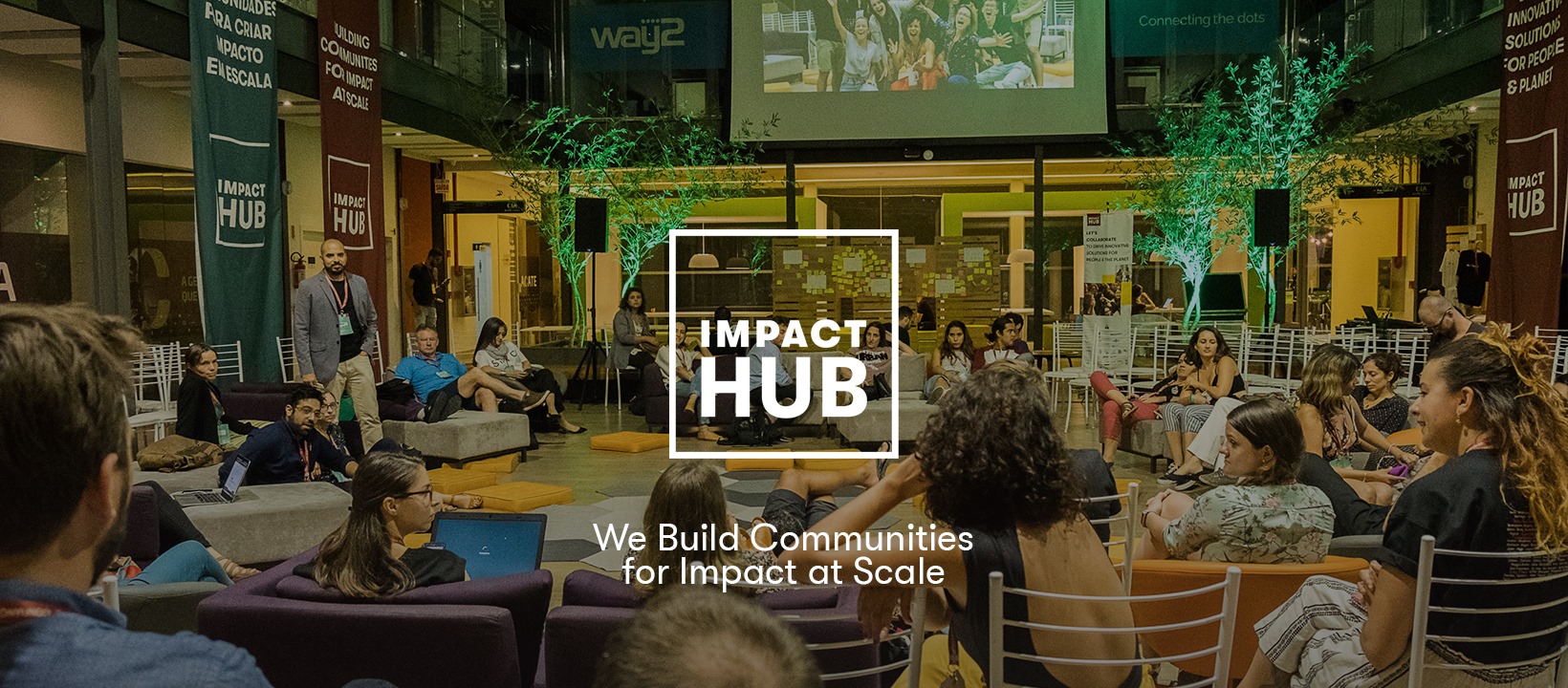
You need a solid business model and culture, which needs to be rigid enough to unite everyone but flexible enough to be adapted to the respective local context. The market in Bamako, Mali looks really different to the one in Stockholm, Sweden, so you need to be able to cater for that and this is what our local founders ensure.
Our Impact Hubs are always driven by a local founding team, who not just understands the local context but also deeply cares about it.
Impact Hub is about societal impact. Why are coworking spaces the way to deliver or to help with achieving the mission?
We want to inspire, connect and enable people around the globe to create a more just and sustainable world. We believe that this can be achieved through the collective effort of many compassionate individuals and through working together. To facilitate this belief, we need to create places, where we can intentionally build this community.

Birmingham Impact Hub
So it’s about giving a home to the entrepreneurs who want to become part of a like-minded and intentional community. Solely having coworkers in a space won’t create societal impact – it’s about intentionally building this community, connecting people and engaging them. To drive systemic change, though, we need to include all parties around the table, that’s why we engage with our cities and governments and we also talk to the big organisations and support them in their goal to become more socially and environmentally conscious.
Solely having coworkers in a space won’t create societal impact – it’s about intentionally building this community, connecting people and engaging with them.
How does the franchise model work?
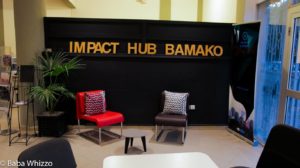
Impact Hub Bamako
As a network, we are locally rooted, whilst globally connected in a democratic model. Every Impact Hub operates independently and then pays 2.5% of their revenues to the network association, which is collectively owned. This means that every Impact Hub has one representative who has one vote. They execute their voting right for every strategic decision that we as a network take. The Association is overseen by a Board that gets elected by majority voting as well. The 2.5% then pays a global team that executes the decisions on their behalf, provides strategy and cares for the network as a whole, as Impact Hub teams already have their hands full with their local operations.
Every Impact Hub operates independently and then pays 2.5% of their revenues to the network association, which is collectively owned.
What is the added value of operating under the name, Impact Hub, globally, for the spaces managers?
Brand awareness and recognition is really important. Impact Hubs also do a lot of business together and knowledge exchange on key impact topics within the United Nations’ Sustainable Development Goals (SDGs) is a big advantage as well. Moreover, our communities are virtually globally connected to facilitate that exchange. After all you can only drive systemic change and create impact at scale if you are doing so in an integrated manner.
Our communities are virtually globally connected to facilitate that exchange. After all you can only drive systemic change and create impact at scale if you are doing so in an integrated manner.
What are the main challenges regarding the global coordination? How do you make sure all locations are aligned with the way to operate and values?

Madrid Impact Hub
Quality control and mission alignment, but over the years we have sophisticated our onboarding process to ensure this well. When a team wants to create an Impact Hub in their city, they come to us when they are at least three members in the team and together they then embark on an onboarding journey, which is a tailored process, that we update on a regular basis, based on our experiences. Every team gets paired with an onboarding coach and has a number of steps they need to do, which are natural in the founding process anyways, like creating a business plan and a financial model as well as developing an impact logic based on the global one that we co-created as a network. The beauty is that every onboarding coach has founded an Impact Hub themselves, so they know about the pain points as well as the key drivers of success. This supports the teams in the best way, whilst ensuring that new teams are mission-aligned and come with the right motivation.
Every onboarding coach has founded an Impact Hub themselves, so they know about the pain points as well as the key drivers of success.
Is there or what kind of support program/projects are you dispatching or providing through the network of Impact Hub spaces?
We run over 200 incubation and acceleration programs annually, many of them together with partners and always on impact-related topics in line with the SDGs. A good example of an accelerator program focused on the SDGs would be Accelerate 2030, with more than 15 Impact Hubs participating or our global partnership with the WWF, which has already led to a number of impact-driven programs with a focus on the environment, like the Plastic Free Ocean Accelerator of Impact Hub Amsterdam and WWF. On a day-to-day basis, we e.g. have a partnership with the Boston Consulting Group who provide our startups with free business clinics. Furthermore, our startups get a lot of exposure through the 11,000+ events that are annually happening in our spaces, where they can participate, pitch, or get connected.
How impactful are Impact Hub locations for the respective ecosystem they operate within and in which fields, would you say?
Impact Hubs are supporting the development of their local ecosystems. Depending on the socio-economic context they are in, this means more educational work to show an alternative to the existing economic system by promoting entrepreneurship, social business models, and the importance of intentional communities with purpose. In more advanced ecosystems, we become players that focus on promoting intentional community building and collaboration – all with a focus on the SDGs. In each ecosystem, we work a lot with different partners, from private to public sector and academia, because you can only really achieve progress towards the SDGs and drive positive change if you work together with all sectors and also involve those unlikely allies that might generally not sit around the same table. Facilitating and driving this exchange and joint initiatives is key to us as well as supporting our entrepreneurs on their journey from idea to scale. You can find a lot of examples of stories in our Impact Report and our latest impact figures in our Community Impact Report. For instance, our Swiss Impact Hubs have teamed up with the MAVA Foundation and are jointly working on the Circular Economy Transition of Switzerland.

Circular Economy Transition, in close collaboration with Impact Hub Switzerland, sanu durabilitas and with the support of the MAVA foundation, contributes to drive the new paradigm for the future of business, policy making and society through this 4 main pillars.
In general, we work a lot with different partners, from private to public sector and academia, because you can only really achieve progress towards the SDGs and drive positive change if you work together with all sectors and also involve those unlikely allies that might generally not sit around the same table.
In the beginning of Impact Hub, coworking was still a marginal activity. Today, coworking is becoming a true industry. How does Impact Hub finds it place?
It is true, back in 2005 when the first Impact Hub opened, coworking was still a very unknown concept that was very innovative and we were one of the early players in the field. These days, coworking is a big industry and we continue to offer coworking services, but with a focus on intentional community building. We build communities for impact at scale, using the SDGs as a lens through which we view the impact we create in the world. For that, we have surveyed our community and their impact as well as the entrepreneurial needs for a long time and have learned that there are certain key success factors that make entrepreneurs thrive. Embedding these key factors and principles into our approach ensures that the Impact Hub experience is valuable, meaningful, as well as impactful. We believe that entrepreneurial networks of communities can be a strong driver for positive change and that is what we want to continue to drive in this world.


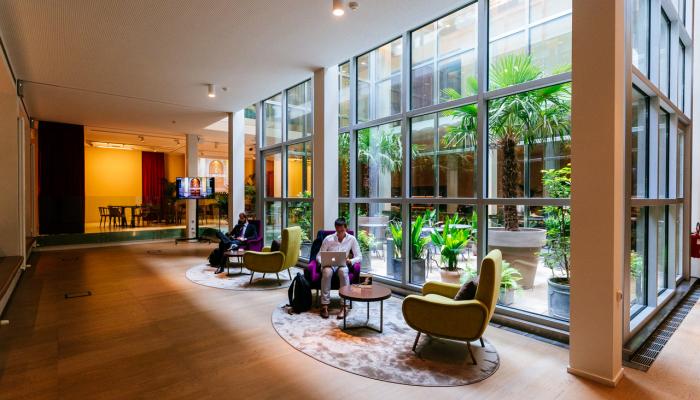

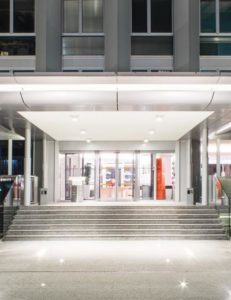


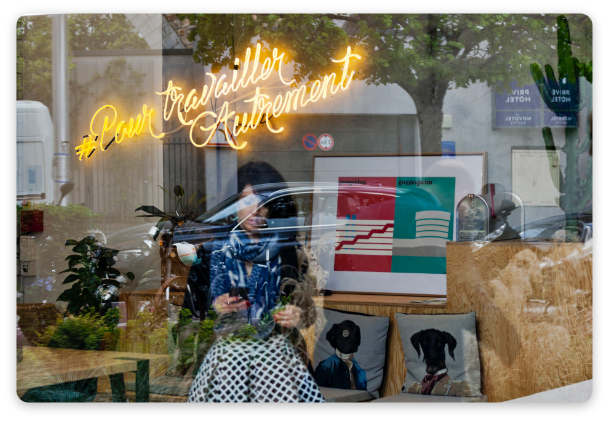


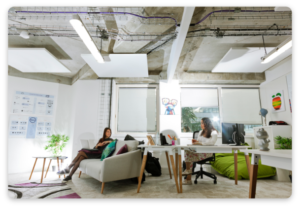


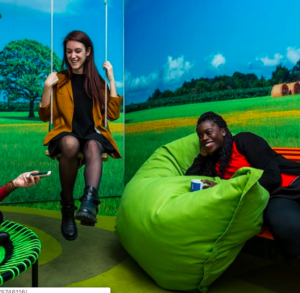

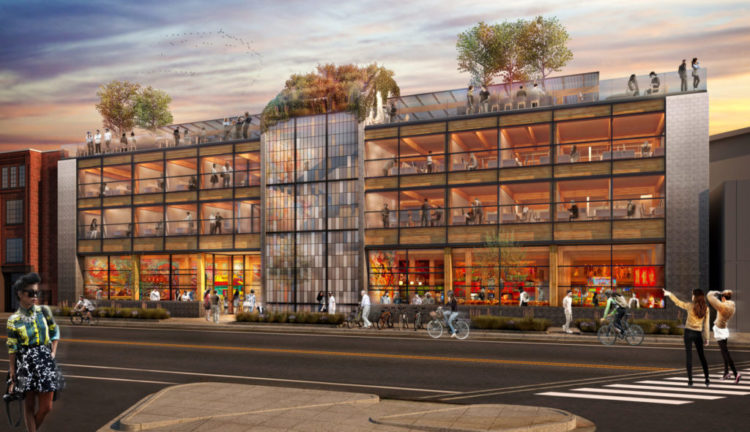
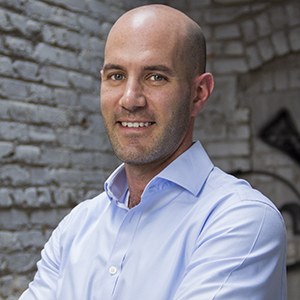
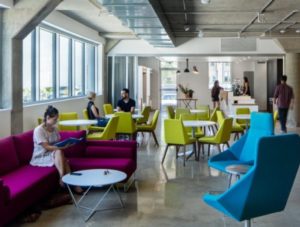
 The spaces that will separate themselves from the competition will have a guest services oriented staff that makes members feel welcome, well cared for, and excited to dive into the projects that brought them into their workspace. Because the service offering is so similar, it is true that lines are blurring between hospitality and coworking. For one, the skill sets overlap so much that many of our best hires come from hospitality. And you see hotels are increasingly getting into the coworking space. Pioneering hotels like the Ace Hotel in New York City, the Hotel Eaton in Washington DC, the Zoku Hotel in Amsterdam, and many others have full fledged coworking spaces and welcome the coworking public to consider the hotel as their living room or office, with free wifi, free-flowing (if not free) coffee and beer and other coworking-like amenities. Business is becoming increasingly nomadic and I predict that we will see more and more joint hotels & coworking spaces that co-locate, share amenities and staff, and synergistically energize each other’s vibes.
The spaces that will separate themselves from the competition will have a guest services oriented staff that makes members feel welcome, well cared for, and excited to dive into the projects that brought them into their workspace. Because the service offering is so similar, it is true that lines are blurring between hospitality and coworking. For one, the skill sets overlap so much that many of our best hires come from hospitality. And you see hotels are increasingly getting into the coworking space. Pioneering hotels like the Ace Hotel in New York City, the Hotel Eaton in Washington DC, the Zoku Hotel in Amsterdam, and many others have full fledged coworking spaces and welcome the coworking public to consider the hotel as their living room or office, with free wifi, free-flowing (if not free) coffee and beer and other coworking-like amenities. Business is becoming increasingly nomadic and I predict that we will see more and more joint hotels & coworking spaces that co-locate, share amenities and staff, and synergistically energize each other’s vibes.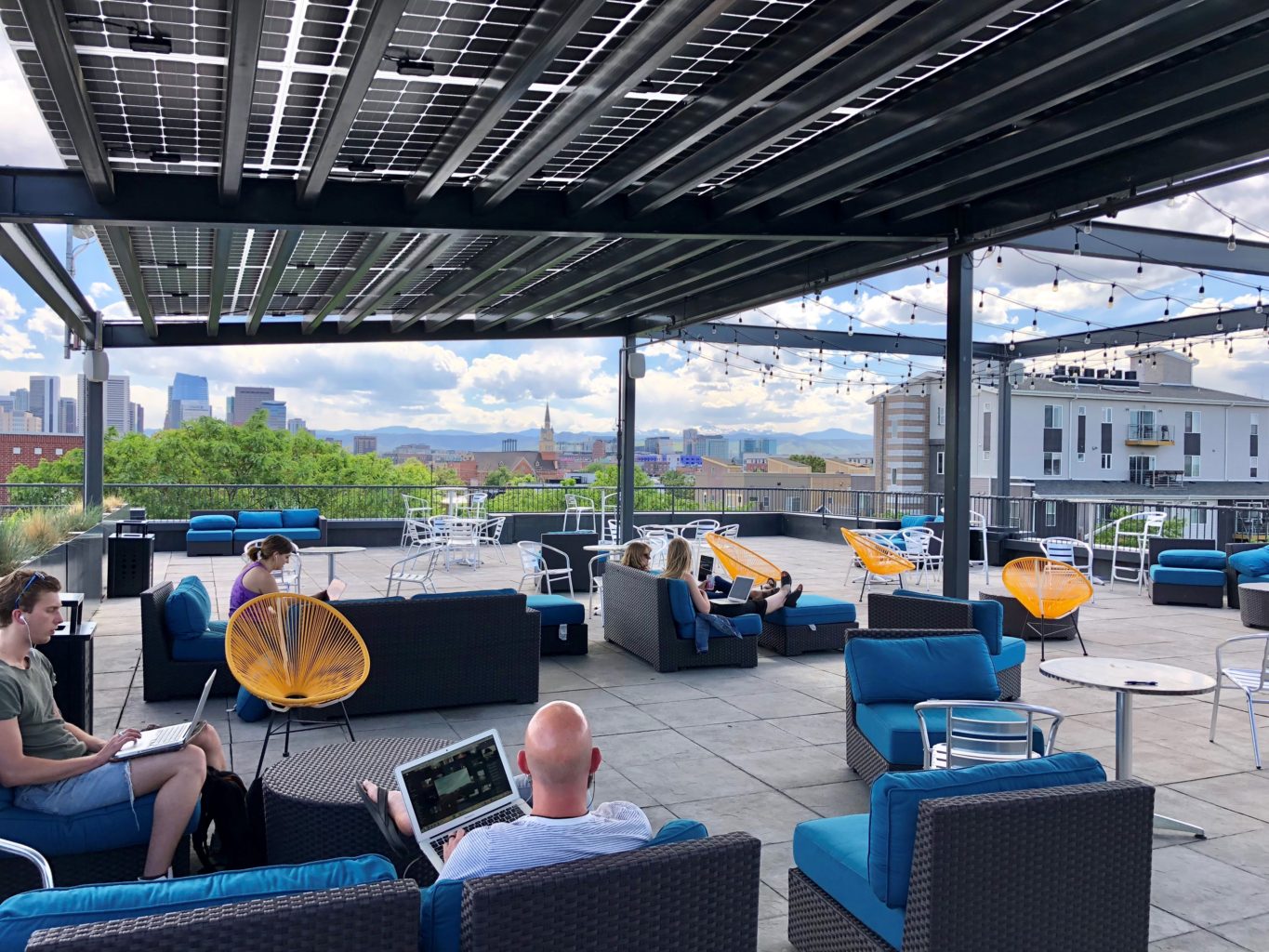
 We compete head-on with franchised coworking spaces and large brands and I do not believe that members in our space are looking for anything dramatically different. Most members are looking for a vibe that meshes well with their personality and work style, for a convenient location, for robust amenities and for a welcoming and engaging community. One difference I have noticed is that when you own your building there is no passing the buck. Any issue with the building becomes your issue. You cannot blame the building management, for example, if the temperature is too cold or if an elevator is out-of-service.
We compete head-on with franchised coworking spaces and large brands and I do not believe that members in our space are looking for anything dramatically different. Most members are looking for a vibe that meshes well with their personality and work style, for a convenient location, for robust amenities and for a welcoming and engaging community. One difference I have noticed is that when you own your building there is no passing the buck. Any issue with the building becomes your issue. You cannot blame the building management, for example, if the temperature is too cold or if an elevator is out-of-service. I think it very much depends on the personality of the company. Some companies will always want their own space and will move out of coworking once they reach a certain size. So I think there will always be a market for traditional office space and the obituaries of traditional office space are a bit premature. However, a few companies have grown to love coworking and will stay in a coworking space for as long as they can be accommodated. Spaces like ours that can accommodate large teams will be able to find companies that want to move in. Nonetheless, I think the bulk of the demand comes from small companies, and we are building out new spaces with a heavy emphasis on private suites for teams of 4-12 people.
I think it very much depends on the personality of the company. Some companies will always want their own space and will move out of coworking once they reach a certain size. So I think there will always be a market for traditional office space and the obituaries of traditional office space are a bit premature. However, a few companies have grown to love coworking and will stay in a coworking space for as long as they can be accommodated. Spaces like ours that can accommodate large teams will be able to find companies that want to move in. Nonetheless, I think the bulk of the demand comes from small companies, and we are building out new spaces with a heavy emphasis on private suites for teams of 4-12 people.






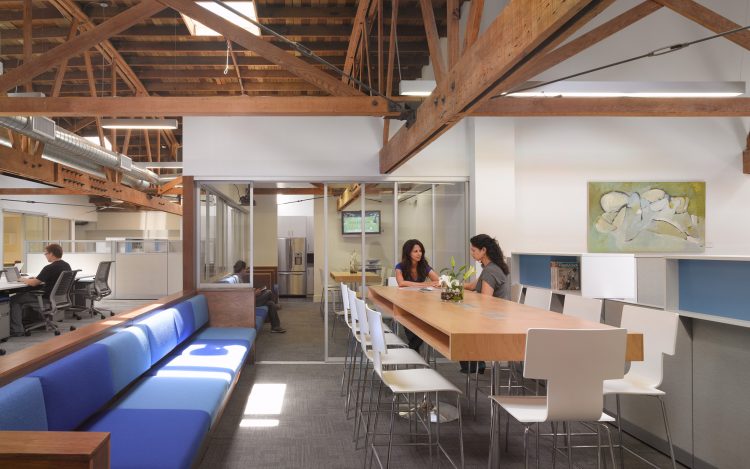


Recent Comments